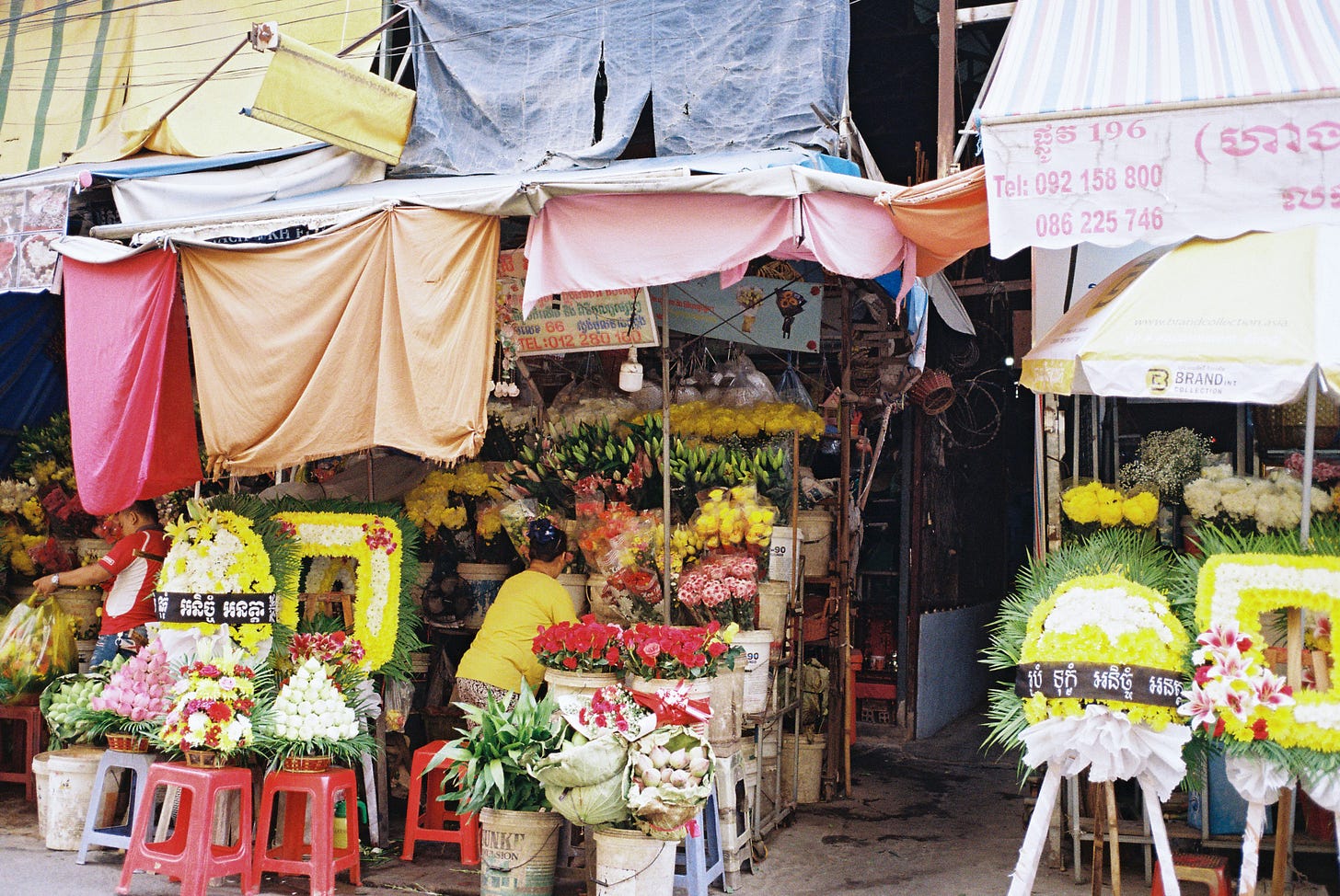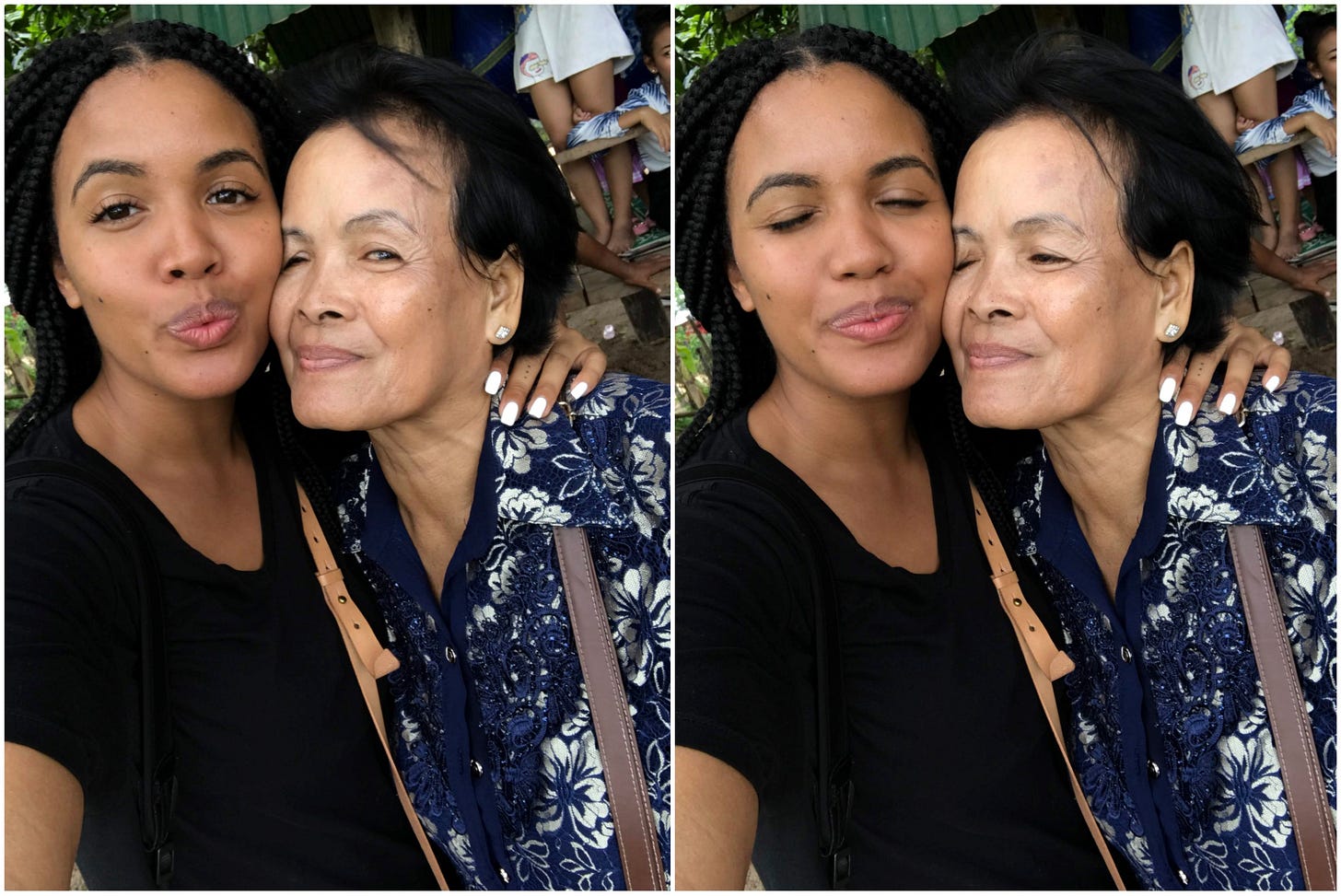Til' Death Do Us Part
My aunt is dying...
My aunt is dying.
And one of my favorite stories of hers my mother begs me not to tell.
Now, I’ll preface this story by admitting certain parts I’m forced to embellish. I’m not fluent in my mother tongue, so the bits I’ve gathered from broken Khmer, wild hands, and twisted expressions are the pieces. My imagination and observations, the glue.
I only met him once.
A shriveled little man with lips the color of charcoal, greyed from all the hand-rolled cigarettes he habitually smoked. He sat in a shaded corner of my aunt's courtyard, ashtray to his left, legs neatly folded under a low wooden table, loosely wrapped in a white linen shirt and checkered sarong. His cough was so violent you could hear his ribcage rattle. Every thirty seconds he’d arch over, curling his spine into a perfect letter c, bring his balled brown fist to the dark pit of his mouth and heave, and heave, and heave until heaving turned to hawking and hawking turned to gasping. Then he’d steady the shaky spoon near his porcelain bowl and gently sink the silver into steamy rice porridge. A meal freshly made by one of three daughters he never helped raise.
They married too young and he left shortly after. I never asked my aunt just how tender of age. The aunt I knew for the last seventeen years, I only knew alone. Her three daughters, I imagined when I was younger, a generous gift from the stork, or aliens, or benevolent by-products of some divine intervention. Because judging by the life she’d made, the one she’d reached into the fiery, crackling center of the earth for—after genocide, displacement, and famine—it was best you think he never existed. Or worse, that he never needed to exist. The kids were washed and watched, food prepped and paid for, and she bought multiple properties, keeping all equity and cash close to chest. While he frolicked around Siem Reap, spending his health and youth on women half her age.
When doctors diagnosed the small black speckles dotting his lungs, when they gave him a handful of months to live, and when no mistress would wear the intimate title caretaker, he stuffed his linen shirts, a pair of dress pants, and a checkered sarong into a green duffle bag and headed south. Thinking that his wife-by-law would do what all women of his time, all over the world did: look the other way, pardon his sins, and welcome him in. Not because he changed or because he was sorry, or that after years of moving from motel to motel, and living a completely separate life (with possibly an entirely different family) he’d finally realized how much he’d missed her, or how her soft face and gentle eyes were the last he wanted to witness before meeting his God.
Nah, not none of that.
He was a man. And that’s what men like his father and his father’s father did:
whatever the fuck they wanted.
When he stumbled up to her doorway, waving the driver away with a few crumpled reil, after forty-something-years of absence, demanding to be taken in and taken care of, with a green duffle bag and half-ashed cigarette in hand, my aunt refused. Despite pleas from her daughters, whose hearts were softened by their absent father’s disheveled appearance. Despite a call from her younger sister in America, who knows nothing of her suffering, insisting she accepts his shallow bids for forgiveness. Despite his raised voice, between gasps, about still being head of household. Despite him lifting the trembling, shriveled hands that once pulsed with strength to strike her.
Still, my aunt refused.
Days passed and her daughters quickly grew tired of caring for him, their own children and husbands needing attention. This man, as everyone saw it, was meant to be his wife-by-laws burden. They pleaded, again and again, that she let him move in. They’d cook the food, and bring the doctor, and dispense medication, just please let him stay.
Two long weeks later, my aunt acquiesced, sourly, and packed a small suitcase full of things to take to her place closer to the city.
Which, it turns out, was the house I sat in four years ago, watching her gracefully glide through the courtyard as if he didn’t exist. She waltzed past the coughing grey ghost without a glance, while he shyly slurped his breakfast. There were whispers, of course. She must be a wicked woman if she was unwilling to take care of her sick husband. It didn’t matter what he’d done! Women had survived far worse. What would her parents say if they were alive? Disgraceful. She was lucky he came home to her instead of one of his mistresses. The rare times I saw her respond, fiercely and directly, were the times I regret not holding a translator app two inches away from her face. I still want to know the sticky web of words she spun to make strangers sit up in shock, and dare not utter another syllable about her character, and her relationship, for the remainder of our visit.
He died shortly after my stay. I heard the news through a muffled phone call to America. Apparently, my aunt didn’t shed a single tear when she heard. On the day of the funeral, she buttoned a white blouse, tied a lace skirt, and pressed her palms together to pay respects. She half-smiled when distant family gave their condolences, dabbed her daughter's forced tears, and reassured her grandkids and great-grandkids that one day they’d see him again. She knew that none of them could possibly understand the painfully distinct difference between being a lover and being kin.
I picture her leaving early, slipping out the side of the luncheon, gold clutch in hand, hailing a tuk-tuk on the corner. Her dusty white dog nipping at her ankles, happily hopping in right after her.
Three moons pass and she calls monks to her house, in secret. Monks that people usually call for blessings, or to bridge present and future, or to tie a wish to reality, but not this time. She needs them to break something for her. A bond she could never sever while her husband-by-law was living.
Dawn breaks through a sea of clouds, three monks tiptoe into her sitting room, orange cloth draped over their shoulders, the incense already lit, intricate gifts wrapped and laid at their feet. She explains in low Khmer what she needs them to do, what she needs them to break. They look at her skeptically, ask if she’s sure. She asks them if they’ve ever met a woman her age who wasn’t.
They all sit, legs woven. She kneels before them, the tips of her fingers pressed against her lips, eyes shut so tight her thin lids tremble. They pray a prayer they’ve never prayed. Casting a promise into her afterlife. Breaking the bond of her marriage from that day forward, ensuring that they’re never matched in the hereafter or in reincarnation. Ensuring that she and her late husband never meet again.
When asked about it she laughs, shakes her head, and sighs with relief.
Not the relief of a woman who ever stopped fighting and simply accepted her fate, but the relief of a woman that reached into the fiery, crackling center of the earth and ensured her own freedom.
When I started writing this story a few months ago, my aunt was dying. When I arrived in Cambodia three weeks ago, she already passed. Just three days prior. I deeply, deeply love, and miss that woman. So much, sometimes it hurts. I’m thankful I got to pay my respects in the place she called home.
Before she left this realm, she agreed that it was ok that her late husband's ashes be placed in the mausoleum she built for herself and her immediate family. I couldn’t help but chuckle looking at the two urns perched side by side, knowing she guaranteed, regardless of their proximity, that they’ll never meet again.
I love you Oum.
Thank you so much for reading.
—Nneka





Nneka your letters are so life giving. Sending you lots of love and peace.
What a beautiful story. Thank you so much for sharing.